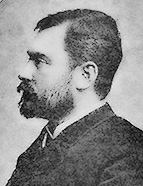

Whether in the historiographical or politico-ideological sphere, Oliveira Martins occupies a unique position in the cultural and political landscape of Portugal in the latter half of the 19th century, and consistently resists any labels attributed to him. A theorist of socialism inspired by Proudhon, later evolving towards recognising the importance of authority and the raison d'état? The mentor of the group Vencidos da Vida [Defeated by Life], in the late 1880s? A romantic historian, cultivating a narrative, dramatic, and artistically expressive history? A metaphysical historian, pessimist, and philosopher of history? A disseminator of an anthropology of an evolutionary and Darwinian nature? Undoubtedly. All of this has been said of him (C. Maurício, A invenção de Oliveira Martins [The Invention of Oliveira Martins]).
Throughout his body of work, a theoretical reflection on the place of history within knowledge emerges, evolving from his early writings to the later biographies. In O helenismo e a civilização cristã [Hellenism and Christian Civilisation] (1878), heavily influenced by the work of Hegel, Oliveira Martins distances his perspective from providentialist, metaphysical, and positivist conceptions. While he acknowledged at the time the formulation of historical laws within the framework of a necessitarian conception of the course of history, he nevertheless observed that “the laws specific to each people vary according to the special conditions of their existence,” identifying a fundamental law: “the encounter of various peoples and their civilisations.” (p.11). However, the role of chance in history is not overlooked. A conviction of the superiority of European civilisation is affirmed in this work, a theme Oliveira Martins revisits in As raças humanas e a civilização primitiva [The Human Races and Primitive Civilisation] (1881). In the latter work, and in the Quadro das instituições primitivas [The Framework of Primitive Institutions] (1883), inspired by the evolutionary anthropology of the time (Spencer, Lubbock, Karl Vogt), he presents a view in which savages are perceived as existing in a stage of childishness and unconsciousness, where emotion and violence dominate rationality. From an ethnocentric perspective, it becomes evident that, while Oliveira Martins supported the abolition of slavery—condemning its inhumanity—he nonetheless perceived it as a necessary and constructive stage in the process of individual and social expansion (Norberto Cunha, Sobre a natureza humana… [On Human Nature], pp. 310–325).
This work is financed by national funds through FCT - Foundation for Science and Technology, I.P, in the scope of the projects UIDB/04311/2020 and UIDP/04311/2020.
